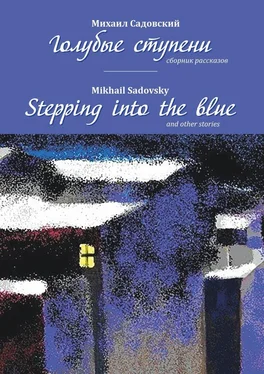Mikhail Sadovsky - Голубые ступени / Stepping into the blue
Здесь есть возможность читать онлайн «Mikhail Sadovsky - Голубые ступени / Stepping into the blue» — ознакомительный отрывок электронной книги совершенно бесплатно, а после прочтения отрывка купить полную версию. В некоторых случаях можно слушать аудио, скачать через торрент в формате fb2 и присутствует краткое содержание. ISBN: , Жанр: russian_contemporary, на русском языке. Описание произведения, (предисловие) а так же отзывы посетителей доступны на портале библиотеки ЛибКат.
- Название:Голубые ступени / Stepping into the blue
- Автор:
- Жанр:
- Год:неизвестен
- ISBN:9785005321114
- Рейтинг книги:3 / 5. Голосов: 1
-
Избранное:Добавить в избранное
- Отзывы:
-
Ваша оценка:
- 60
- 1
- 2
- 3
- 4
- 5
Голубые ступени / Stepping into the blue: краткое содержание, описание и аннотация
Предлагаем к чтению аннотацию, описание, краткое содержание или предисловие (зависит от того, что написал сам автор книги «Голубые ступени / Stepping into the blue»). Если вы не нашли необходимую информацию о книге — напишите в комментариях, мы постараемся отыскать её.
Голубые ступени / Stepping into the blue — читать онлайн ознакомительный отрывок
Ниже представлен текст книги, разбитый по страницам. Система сохранения места последней прочитанной страницы, позволяет с удобством читать онлайн бесплатно книгу «Голубые ступени / Stepping into the blue», без необходимости каждый раз заново искать на чём Вы остановились. Поставьте закладку, и сможете в любой момент перейти на страницу, на которой закончили чтение.
Интервал:
Закладка:
«But everybody asks Him! The Russians in their churches, the Tatars in their mosques, and the Jews…»
«No. There’s nothing that needs asking for. I tell Him what the situation is so that He’ll know the truth. And He Himself knows what to do.»
«And how do you plan to get yourself up those stairs?»
«That’s no matter. Little by little. But the closer I get to Him, the better He’ll hear me. I don’t exactly shout, you know. I could even tell it all to Him right here, He’d still hear me. But I think He’s pleased that I’ve been going to the synagogue all these years.»
«Everything’s all the same, it’s all the same.»
«Little one, the sun too rises and sets, and people are born and die, and money comes and goes. When you get older, you’ll understand.»
«What do you mean, Grandma? I’m already forty!»
«It’s not that you’re forty, it’s that I’m ninety. I never have asked Him. It happened once that – a verbrennen soll alts wern… das ich hab gemeint… du verstehst, du verstehst alts – und ich hab gerechnet – das ist ein sof (I should let it all all burn up … that’s what I thought… you understand, you understand it all, and I decided then that this was the end). But He decided otherwise.»
« Bobei, meine teure Bobei! Ich bet dir, leb noch ein hundert jahr! (Grandma, my dear Grandma! I beg you, live a hundred years more!)»
«Oh, you’re tricky! Yeshefitcha (A real sweetikins)! You still want to be young! No, no, enough about that. I still won’t go in your car. But if you change a rouble for me and give me ten-kopeck pieces, I can give out some money to everyone as they walk out.»
Little by little she got herself ready. She deposited the change from the rouble into a ragged little purse with a button in the middle. Another purse, a little larger and fatter, was dropped into the pocket of a long black skirt. Then she pulled on an old but still quite respectable overcoat which barely covered her skirt (though it wasn’t a dirty-looking coat like the ones most women her age wore). After checking her keys, she took out a home-made juniper walking-stick, a very nice one with a long curved handle, on which she could even support herself with one elbow, and set foot out the door.
She had turned ninety two months ago. There was no fancy celebration. But all the neighbors somehow found out about it and came round. They rang the doorbell and offered their congratulations, even though they could have done this on the street. But still they came. She hadn’t really been close friends with them, the neighbors, but whenever she learned that someone was ill, she invariably went over and simply extended her help without even asking whether the help was required. She had done this even as a young woman. She had been living in this same spot for several decades already.
She wasn’t afraid to ring anyone’s bell. Their husbands had all been taken away by the secret police. And where both parents had been taken, she wasn’t afraid to go and feed the children that had been left behind. And when disaster befell her, and nobody rang the doorbell, and when people saw her on the street, and would simply cross to the other side and not say hello so as not to make trouble, 12 12 During the Stalinist period it was considered a citizen’s duty to avoid all contact with relatives of a declared ’enemy of the people’.
she didn’t take offense. People were people, after all. Some lived one way, some another.
«How old was I then? Sixty? Well, what is there to be afraid of at sixty? I didn’t know then I’d be alive at ninety!»
She didn’t like remembering everything all at once, which she considered tanatamount to «throwing everything together in a heap», but if she happened to recall something, she would remember it in such detail as though it had occurred just a few moments ago and she were simply explaining the scene to a blind person so that he would know what was going on.
And then at every opportunity she would tell Him the story too, not necessarily about herself, but today was special, and after her account she allowed herself to ask: « Gotteniu, du bist hat nicht vergessen – ich hab doch allein geblieben? Gotteniu, ich bet dir, nicht vergess uben mir. Ich nur dermahn dir. (Lord, you haven’t forgotten about me – am I the only one left here? Lord, I beg you, don’t forget about me. Just reminding you!)»
On the steps of the synagogue near the exit she handed out the ten-kopeck pieces from her purse, saying « Seit gesund! Seit gesund! (Be healthy! Be healthy!)» and shuffled up the hill to the bus stop. She had a long journey ahead of her, but she knew the way quite well, and, what’s more, she knew she would get there for certain. First a trolleybus ride, then it was on to the subway with one transfer, and finally another bus ride – about two hours altogether one-way.
At the gates to the cemetery she stopped to catch her breath and look about her. There was someone she needed to visit here. She stood still for five minutes or so and then headed down the central allée – she was getting close now. At the familiar little gate she undid the cord fastener and entered the low-fenced enclosure. After placing two fir boughs on the grave, bushy side up, she wiped the enamelled photograph on the headstone with the palm of her hand, put her face up close to it, wiped it once again, then kissed it and took her seat once more on the damp black bench.
« Khaint ich hab do mit dir, Ziama. Du bist hat nicht vorgessen was vor ein Tag khaint? Nein, ich gleib dir, nein! (Today I’m here with you, Ziama. You haven’t forgotten what day it is today. No, I’m sure you haven’t!)»
Passers-by naturally might have surmised that here was just a crazy old woman talking to herself. Somebody might have thought she was saying a prayer. In fact, she was simply talking with her husband.
«It was a cloudy day back then too, and you were in a hurry, as always, and I had to get to the village. We never had time to be together back then. Still, thank God, we lived fifty-six years together, if you count the eighteen you spent in prison. But of course they count! If we hadn’t been waiting for each other all those years, we might not have survived.
«It didn’t work out with the children, because of that. If we had had four or five, you wouldn’t have minded! I should say not! I know you! You were happy about that. But thank God He gave us two. We pulled through! You were either fighting or building, or in prison. And when you came back, I was oh so many years older – we won’t even count them.
«Of course it would have been nice if you’d waited for me. What were you in such a hurry for – to leave? You were always in a hurry! Hurry, hurry, hurry!
«It’s getting difficult for me to get here on my own. I won’t tell you about the children and grandchildren – you know everything anyway. But the great-grandchildren – well, those pishery (little scribes) – Ach, danke dir, Gotteniu! Alle gesund! (Oh, thank you God! All are healthy!)
«The rabbi said today that we should «love our neighbor as ourselves» – and that this applies most of all to people of the same profession. Like for a cobbler it’s hardest of all to love another cobbler, or a tailor to love a tailor – because of the competition.
«Well, what d’you know, he’s probably right, that young rabbi. He’s such a clever fellow. Of course, I didn’t tell him I was coming to see you. One shouldn’t break the sabbath, but I couldn’t do it any other day. It’s our anniversary today, not tomorrow, so I think He will forgive me.
«But you just tell me what I should cook for you today. Ninety’s not all that much when you can boil your own potatoes and go to the store for milk. Well, okay, they bring milk to me – potatoes too, and I don’t boil them for myself very often. That Gentile, Galka, cooks pretty good. But I can say what I think!…
Читать дальшеИнтервал:
Закладка:
Похожие книги на «Голубые ступени / Stepping into the blue»
Представляем Вашему вниманию похожие книги на «Голубые ступени / Stepping into the blue» списком для выбора. Мы отобрали схожую по названию и смыслу литературу в надежде предоставить читателям больше вариантов отыскать новые, интересные, ещё непрочитанные произведения.
Обсуждение, отзывы о книге «Голубые ступени / Stepping into the blue» и просто собственные мнения читателей. Оставьте ваши комментарии, напишите, что Вы думаете о произведении, его смысле или главных героях. Укажите что конкретно понравилось, а что нет, и почему Вы так считаете.












